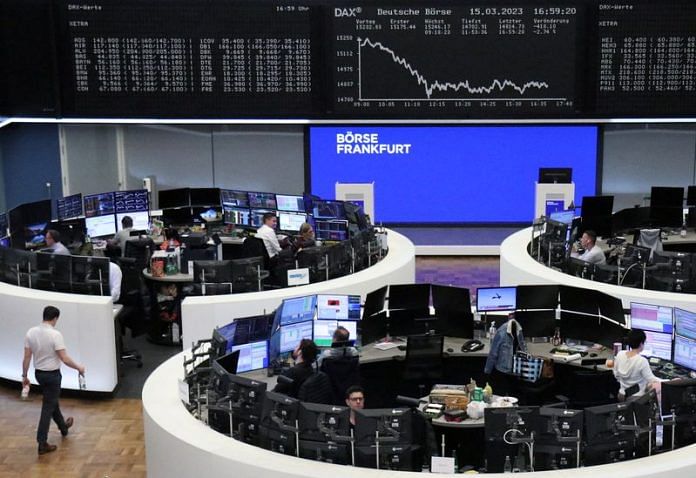By Elizabeth Howcroft
LONDON (Reuters) – Global markets showed signs of recovery in early European trading on Thursday, with stocks rising and the U.S. dollar pulling back from recent gains, while finance chiefs of the U.S., Japan and Korea issued a rare warning about currency weakness.
Stock markets sold off earlier this week, while Treasury yields and the U.S. dollar surged to multi-month highs, as investors were spooked by tensions in the Middle East after Iran’s missile and drone attack on Israel on April 13. Mixed quarterly company earnings so far and recent comments from the U.S. Federal Reserve, which dampened rate cut expectations, also made investors more risk-averse.
The risk-off pullback showed signs of easing on Thursday. Asian stocks made their biggest gains in a month and European stocks opened higher, helped by more positive company earnings.
At 0855 GMT, the MSCI World Equity Index was up 0.2% on the day, but still down 1.9% so far this week.
The pan-European STOXX 600 was up 0.2%, while London’s FTSE 100 was up 0.3%.
Fiona Cincotta, senior markets analyst at City Index, said that markets were being supported by a shift in focus away from the Fed and towards upcoming earnings, including Netflix later on Thursday.
Comments from European Central Bank vice president Luis de Guindos and an easing of oil prices have also helped support sentiment in Europe, she added.
“There’s still a little bit of optimism of lower rates, in the euro zone, that’s helping support European stocks,” Cincotta said.
Oil prices eased, with Brent futures down 0.5% at $86.87 a barrel and U.S. West Texas Intermediate (WTI) crude futures down 0.5% at $82.27 a barrel.
The two benchmarks slid 3% on Wednesday, in a move attributed to signs that fuel demand is lower than expected this year, amid flagging economic growth in China.
Lower oil prices can be seen as positive for stock markets as they help contain inflation, improving the chances for central bank interest rate cuts.
Analysts do not expect dramatic new sanctions on Iranian oil, which accounts for about 3% of global output.
The U.S. dollar index was down 0.1% at 105.84 and the euro was up by less than 0.1% at $1.0677. The dollar had surged in recent weeks, and is up 1.3% so far this week after the index hit as high as 106.51 on Tuesday.
The United States, Japan and South Korea agreed to “consult closely” on foreign exchange markets in their first trilateral finance dialogue on Wednesday, acknowledging concerns from Tokyo and Seoul over their currencies’ recent sharp declines.
Analysts said the rare warning from the three countries’ finance chiefs may lay the groundwork for Japan to intervene in the yen.
The dollar-yen pair was at 154.34, within sight of Tuesday’s 154.79, which was the yen’s weakest in 34 years.
U.S. Treasury yields were edging down, with the 10-year yield at 4.5711% and the 2-year yield at 4.9241%.
Euro zone government bond yields also edged lower, with Germany’s 10-year yield down 3 basis points at 2.441%.
Gold was a touch higher at 2,379.77.
(Reporting by Elizabeth Howcroft; Editing by Tomasz Janowski)
Disclaimer: This report is auto generated from the Reuters news service. ThePrint holds no responsibilty for its content.



